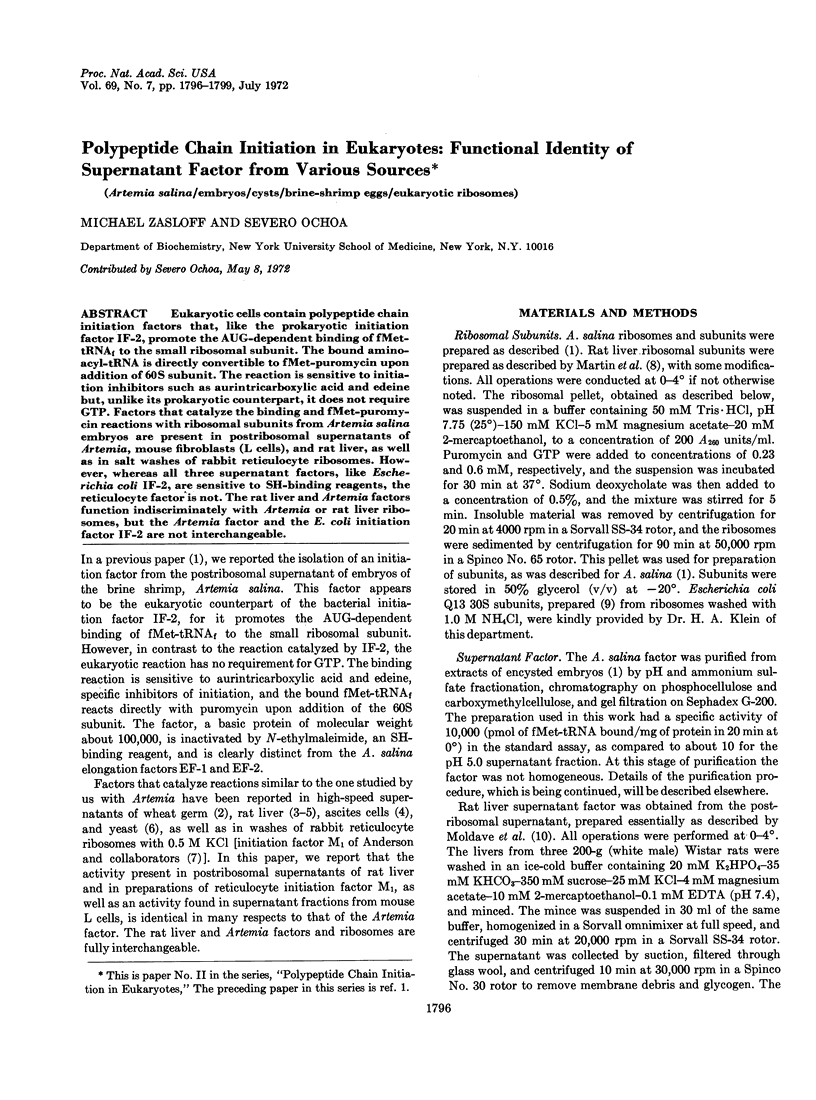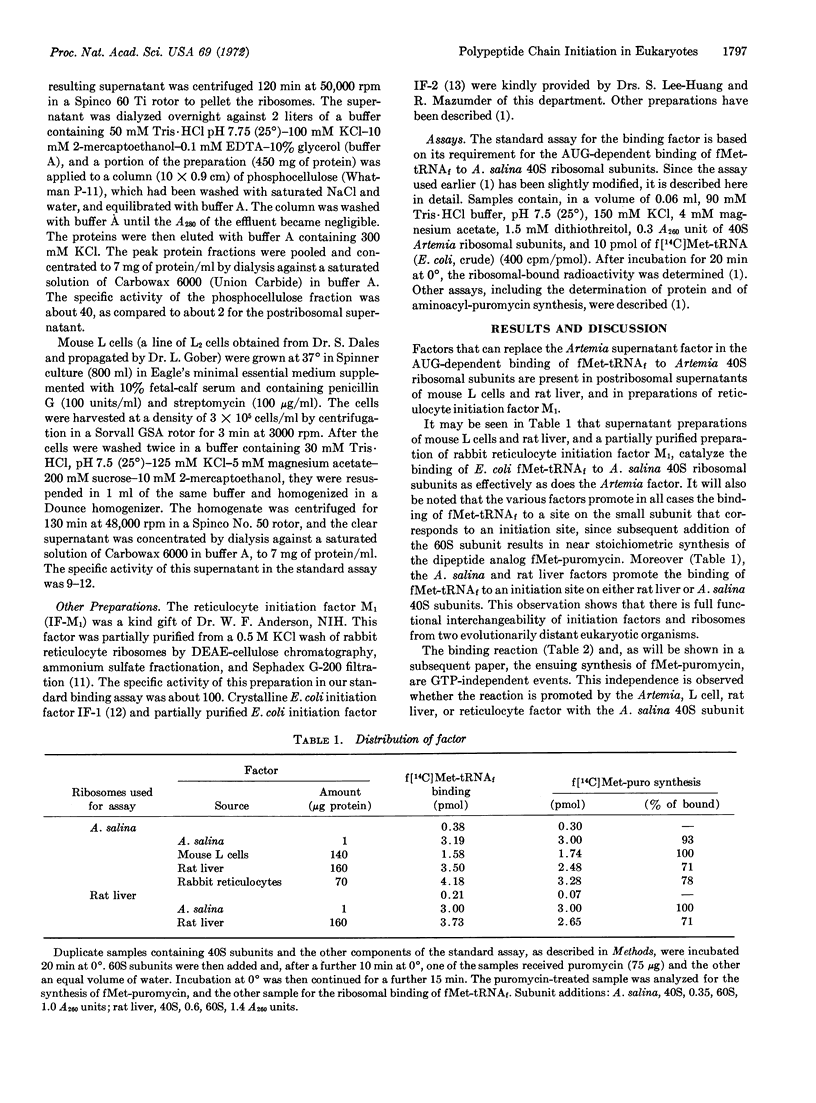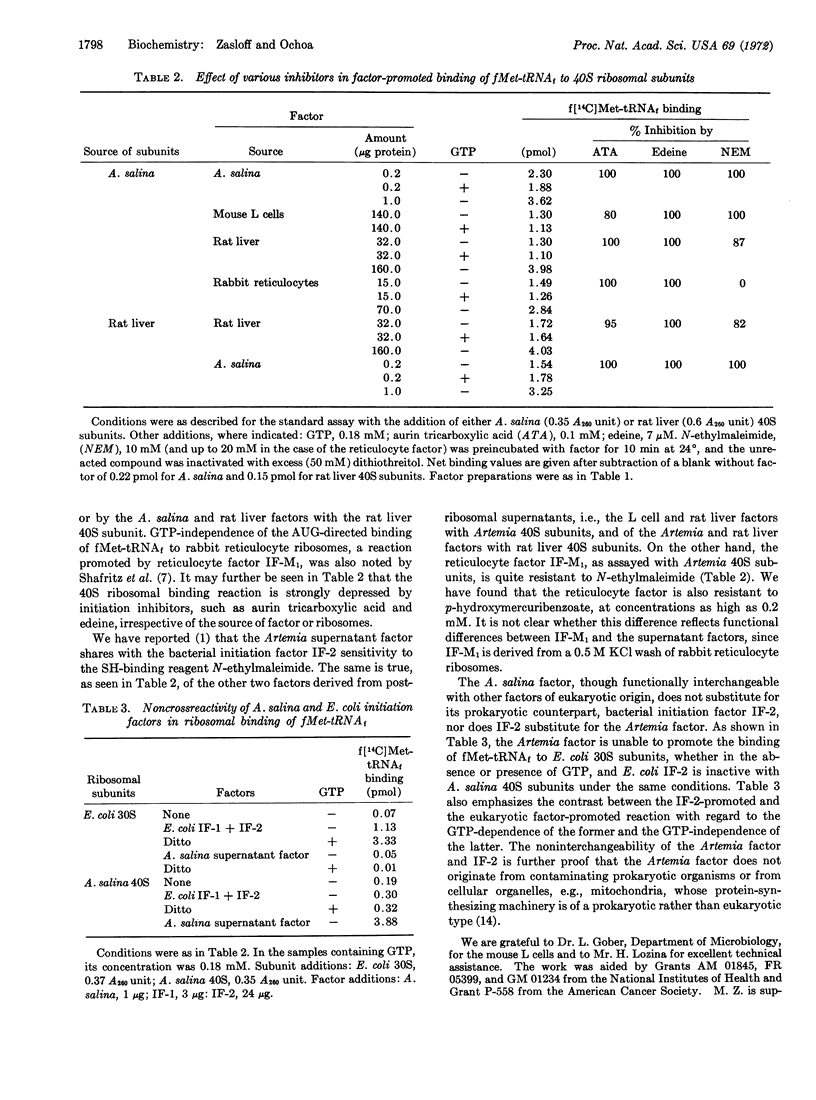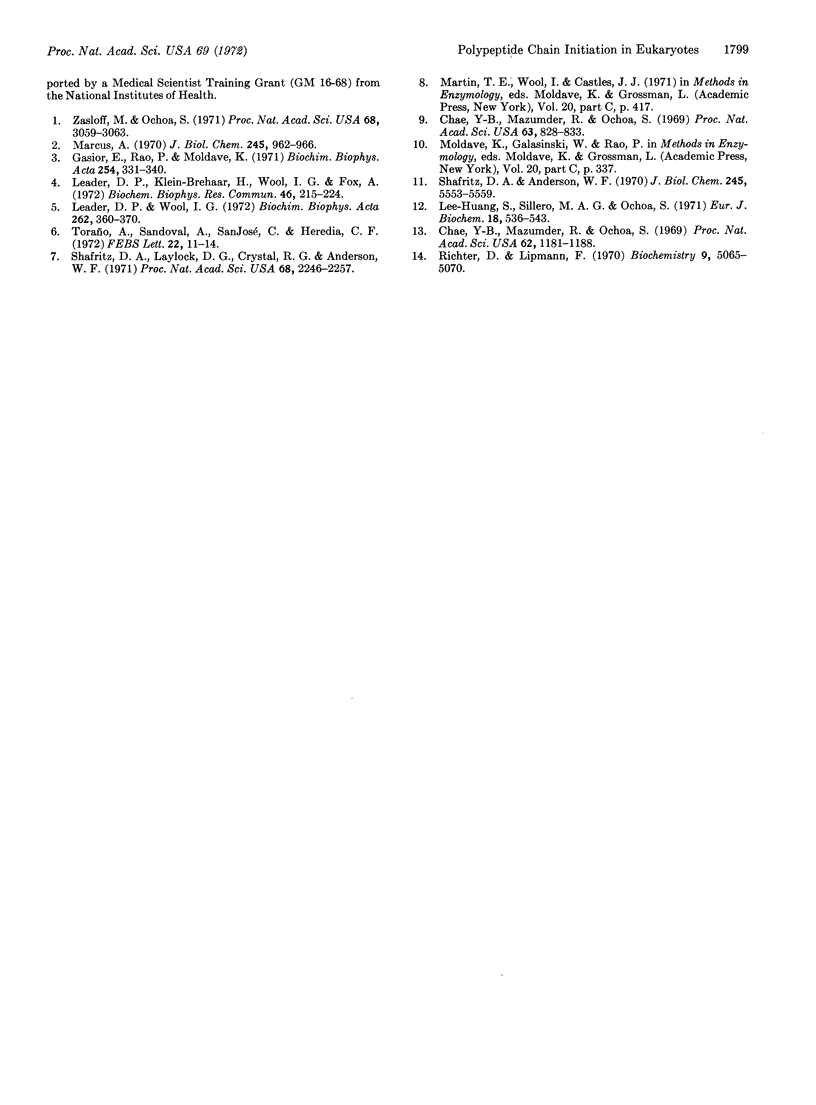Abstract
Eukaryotic cells contain polypeptide chain initiation factors that, like the prokaryotic initiation factor IF-2, promote the AUG-dependent binding of fMet-tRNAf to the small ribosomal subunit. The bound amino-acyl-tRNA is directly convertible to fMet-puromycin upon addition of 60S subunit. The reaction is sensitive to initiation inhibitors such as aurintricarboxylic acid and edeine but, unlike its prokaryotic counterpart, it does not require GTP. Factors that catalyze the binding and fMet-puromycin reactions with ribosomal subunits from Artemia salina embryos are present in postribosomal supernatants of Artemia, mouse fibroblasts (L cells), and rat liver, as well as in salt washes of rabbit reticulocyte ribosomes. However, whereas all three supernatant factors, like Escherichia coli IF-2, are sensitive to SH-binding reagents, the reticulocyte factor is not. The rat liver and Artemia factors function indiscriminately with Artemia or rat liver ribosomes, but the Artemia factor and E. coli initiation factor IF-2 are not interchangeable.
Keywords: Artemia salina, embryos, cysts, brine-shrimp eggs, eukaryotic ribosomes
Full text
PDF



Selected References
These references are in PubMed. This may not be the complete list of references from this article.
- Chae Y. B., Mazumder R., Ochoa S. Polypeptide chain initiation in E. coli: isolation of homogeneous initiation factor E2 and its relation to ribosomal proteins. Proc Natl Acad Sci U S A. 1969 Apr;62(4):1181–1188. doi: 10.1073/pnas.62.4.1181. [DOI] [PMC free article] [PubMed] [Google Scholar]
- Chae Y. B., Mazumder R., Ochoa S. Polypeptide chain initiation in E. coli: studies on the function of initiation factor F1. Proc Natl Acad Sci U S A. 1969 Jul;63(3):828–833. doi: 10.1073/pnas.63.3.828. [DOI] [PMC free article] [PubMed] [Google Scholar]
- Gasior E., Rao P., Moldave K. The interaction of aminoacyl-tRNA and N-acylaminoacyl-tRNA with ribosomes and ribosomal subunits. Biochim Biophys Acta. 1971 Dec 16;254(2):331–340. doi: 10.1016/0005-2787(71)90841-0. [DOI] [PubMed] [Google Scholar]
- Leader D. P., Klein-Bremhaar H., Wool I. G. Distribution of initiation factors in cell fractions from mammalian tissues. Biochem Biophys Res Commun. 1972 Jan 14;46(1):215–224. doi: 10.1016/0006-291x(72)90652-3. [DOI] [PubMed] [Google Scholar]
- Leader D. P., Wool I. G. Partial purification and characterization of an initiation factor from rat liver which promotes the binding of phenylalanyl-tRNA to 40 -S ribosomal subunits. Biochim Biophys Acta. 1972 Mar 24;262(3):360–370. doi: 10.1016/0005-2787(72)90274-2. [DOI] [PubMed] [Google Scholar]
- Lee-Huang S., Sillero M. A., Ochoa S. Isolation and properties of crystalline initiation factor F1 from Escherichia coli ribosomes. Eur J Biochem. 1971 Feb;18(4):536–543. doi: 10.1111/j.1432-1033.1971.tb01274.x. [DOI] [PubMed] [Google Scholar]
- Marcus A. Tobacco mosaic virus ribonucleic acid-dependent amino acid incorporation in a wheat embryo system in vitro. Formation of a ribosome-messenger "initiation" complex. J Biol Chem. 1970 Mar 10;245(5):962–966. [PubMed] [Google Scholar]
- Richter D., Lipmann F. Separation of mitochondrial and cytoplasmic peptide chain elongation factors from yeast. Biochemistry. 1970 Dec 22;9(26):5065–5070. doi: 10.1021/bi00828a004. [DOI] [PubMed] [Google Scholar]
- Shafritz D. A., Anderson W. F. Isolation and partial characterization of reticulocyte factors M1 and M2. J Biol Chem. 1970 Nov 10;245(21):5553–5559. [PubMed] [Google Scholar]
- Shafritz D. A., Laycock D. G., Crystal R. G., Anderson W. F. Requirement for GTP in the initiation process on reticulocyte ribosomes and ribosomal subunits. Proc Natl Acad Sci U S A. 1971 Sep;68(9):2246–2251. doi: 10.1073/pnas.68.9.2246. [DOI] [PMC free article] [PubMed] [Google Scholar]
- Toraño A., Sandoval A., Sanjosé C., Heredia C. F. A soluble factor from yeast which promotes a GTP-dependent binding of N-acetylphenylalanyl-tRNA to the ribosomes. FEBS Lett. 1972 Apr 15;22(1):11–14. doi: 10.1016/0014-5793(72)80206-0. [DOI] [PubMed] [Google Scholar]
- Zasloff M., Ochoa S. A supernatant factor involved in initiation complex formation with eukaryotic ribosomes. Proc Natl Acad Sci U S A. 1971 Dec;68(12):3059–3063. doi: 10.1073/pnas.68.12.3059. [DOI] [PMC free article] [PubMed] [Google Scholar]


